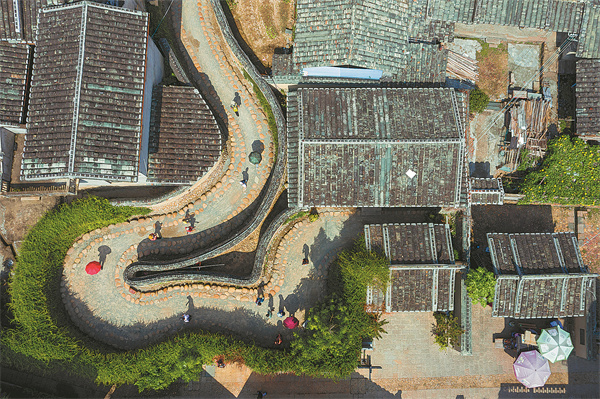October 7, 2022
BEIJING – Zhang Yuxin has witnessed her career take off and has developed a deep affection for the countryside as a result of her work in China’s hinterlands.
The 33-year-old from Taiwan has been working in the mainland as an interior designer for the better part of a decade. Like a magician, she is able to transform dilapidated spaces with her ideas, and make empty spaces more efficient.
“Before beginning a project, we go on field trips to understand the needs of local people and listen to their advice, and then we offer suggestions on beautifying or vitalizing spaces,” she said.
Zhang recalled the first renovation project she did, saying that the project not only preserved the site’s uniqueness but also delivered a number of benefits and increased the confidence of residents.
She first arrived in Fuzhou, capital of Fujian province in 2014 to take part in the renovation of Songkou, an ancient town with a history of over 1,000 years, which is located in Fuzhou’s Yongtai county.
Since 2014, the local government has brought in cultural and creative teams to take part in the protective development of its cultural and historical sites. Taiwan-based Open and Union Studio (Oustudio) was one of those invited to get a feel for the ancient town’s pulse. “I was invited to take part in the program, and felt that it would be a brand new experience.”

An aerial photo of Songkou, an ancient town in Yongtai county in Fuzhou, Fujian province, on July 7.[Photo provided to China Daily]
Zhang told China Daily that Oustudio created a homestay called Songkouqi, which means “let tourists relax” in English, in an old three-story residence.
“In order to restore the original appearance of the ancient house, our team proposed using clay to coat the exterior cement walls and decorating the facade with bamboo and wooden additions,” Zhang said.
Since its inception, Songkouqi has played host to a number of famous magazine editors-in-chief and movie stars and with business booming, it once made as much as 8,000 yuan ($1,145) a day.
“The homestay was an exemplary project that allowed the public to understand the possibilities of their own houses,” Zhang said.
Some 10 new homestays have been created in the town since then, and over a third are managed by villagers, who have been able to emerge from poverty as a result of thriving tourism.
In Songkou, the team also repaired a crane-shaped road, which was built at the end of the Song Dynasty (960-1279) and is a popular scenic spot as a result of its unique shape.
At the time, numerous sections of the road had been damaged, with some parts encroached upon by surrounding buildings.
“We endeavored to fix the road without destroying its primitive style,” she said.
The team decided to rebuild one wall using rammed earth instead of bricks and cement. To create the best effect, a number of craftsmen who had already been retired for many years worked with Oustudio testing out different types and proportions of soil.
“Only through working together, exchange and interaction with officials, villagers, designers and other stakeholders, can the planning and rebuilding of rural areas achieve a sound result. At first, villagers might not understand, and could even be suspicious of what we were doing, but thanks to government policy and coordination, they ended up supporting our projects and even seeking our help privately,” Zhang said.
The designer believes that the countryside is a promising place with broad prospects for development as more and more talented individuals return to villages and start up businesses.
Two years ago, she set up an independent studio with designers in Fuzhou and began to offer consulting on vitalizing local spaces. The same year, she returned to Songkou again.
Zhang said that she was delighted to help a scallion pancake store in the ancient town set up an experience room where visitors could make pancakes themselves. “Everyone wins, the experience improves for visitors and incomes increase for the owners.”
She said that her work is always fresh and full of challenges because “there is no one-size-fits-all solution”.
This year, Zhang and her team have taken on two renovation projects: one in Zishan village, a former revolutionary base and another in Liangzhai village, home to the first fort built by women in China.
“Each village has its own unique ways and customs,” Zhang said, adding that according to their plans, the team will highlight Red culture in the former village, while focusing on women’s culture in the latter.
Having lived in Fuzhou for nearly ten years, Zhang finds that the city’s culture and history are very similar to those of Taiwan, which she said gives her a feeling of intimacy.
“For instance, some people in Fujian and Taiwan speak the Southern Min language and worship Matsu (goddess of the sea),” she said, adding that the eating habits and architectural styles of both places resemble each other.
“The closeness between the Chinese mainland and Taiwan is in our blood, our history and our culture, and Fuzhou has become my second home. My friends in Taiwan are interested in my life here,” Zhang said, adding that she often shares her experiences and invites her friends to pursue careers in Fujian.
“When we come to the Chinese mainland, we feel the goodwill and help,” she said.
“As a result, we are able to understand the real China, and bridge the communication gap across the Taiwan Straits.”


